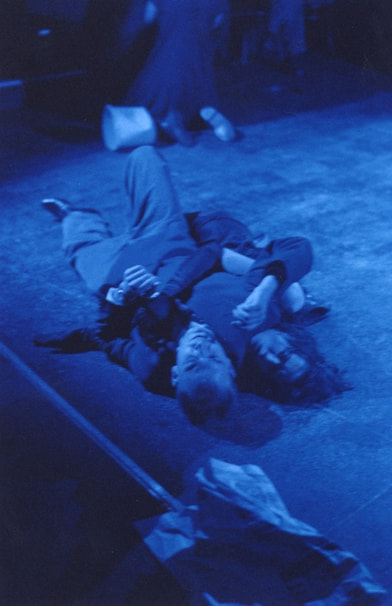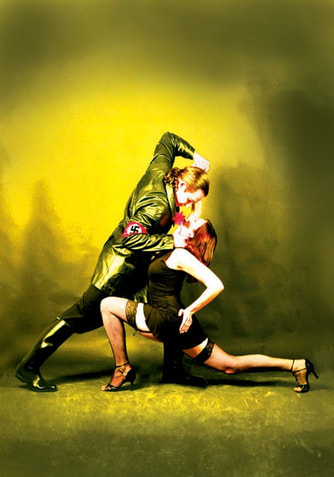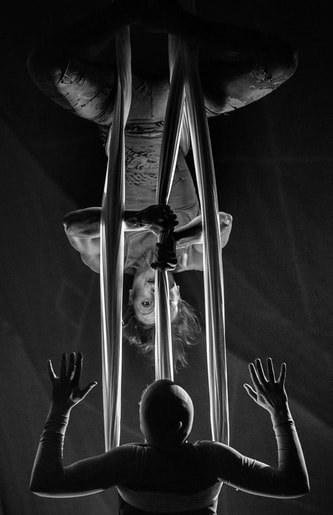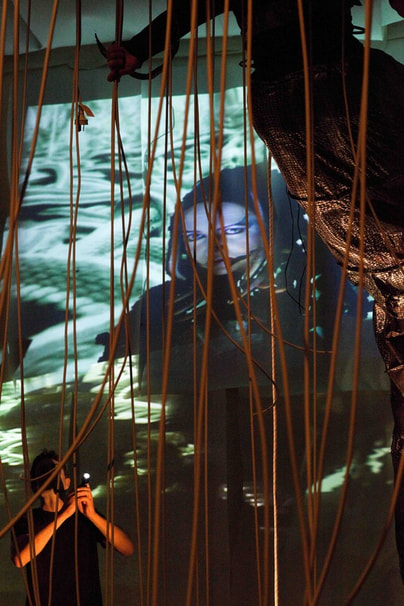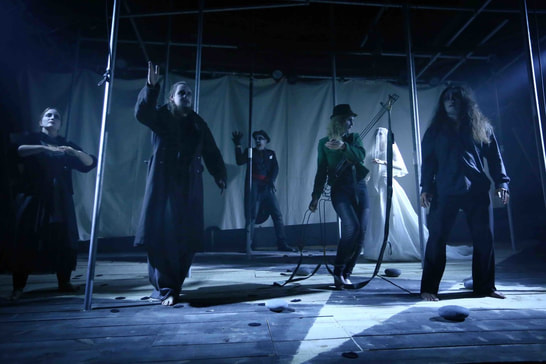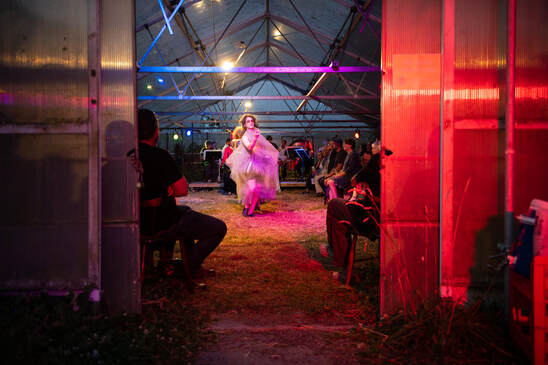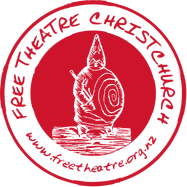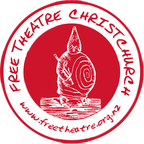
In Free Theatre Christchurch (est. 1979) is an interdisciplinary performance laboratory based in Christchurch, New Zealand where artists work together to create innovative, high quality contemporary performance. Peter Falkenberg is the founder and Artistic Director of the company.
As the country’s longest running producer of avant-garde theatre, the company offers a unique experience for artists and audiences not catered for by local commercial theatres or the amateur theatres that imitate them. The Free Theatre works as an ensemble, conceiving work from an initial idea and developing it over a longer period of time. This work often takes place in spaces that are not conventional in terms of theatre. As a professional art theatre, Free Theatre is closer in creative process to contemporary dance companies or international experimental art theatre groups such as Ex Machina or The Wooster Group that create exciting new work by pushing beyond generic boundaries.
The company works with artistic collaborators from multiple disciplines and with diverse and unusual texts (literary, filmic, musical, social and cultural) to produce completely new and original work. Core ensemble members undertake years of professional training in different performance techniques and traditions and conduct ongoing company training as well as teaching into the Free Theatre Education Programme.
In 2017 Shirley Horrocks presented her documentary on the company Free Theatre: the 37 year experiment in the NZIFF.
As the country’s longest running producer of avant-garde theatre, the company offers a unique experience for artists and audiences not catered for by local commercial theatres or the amateur theatres that imitate them. The Free Theatre works as an ensemble, conceiving work from an initial idea and developing it over a longer period of time. This work often takes place in spaces that are not conventional in terms of theatre. As a professional art theatre, Free Theatre is closer in creative process to contemporary dance companies or international experimental art theatre groups such as Ex Machina or The Wooster Group that create exciting new work by pushing beyond generic boundaries.
The company works with artistic collaborators from multiple disciplines and with diverse and unusual texts (literary, filmic, musical, social and cultural) to produce completely new and original work. Core ensemble members undertake years of professional training in different performance techniques and traditions and conduct ongoing company training as well as teaching into the Free Theatre Education Programme.
In 2017 Shirley Horrocks presented her documentary on the company Free Theatre: the 37 year experiment in the NZIFF.
1979-1989
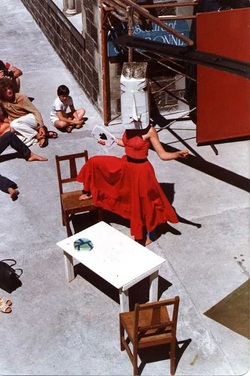
Ox on the Roof (Cocteau, 1982)
Free Theatre Christchurch was established in 1979 by a group of staff and students at Canterbury University, Christchurch New Zealand. The aim was to build a laboratory theatre that would allow for experimentation with different styles, forms and texts beyond the predominantly English literary work of mainstream New Zealand theatre. After initial success and keen interest, particularly with younger artists and audiences, the group decided to form a permanent working theatre cooperative with founder Peter Falkenberg becoming the Artistic Director. In 1982 they converted an old lecture theatre in the former Canterbury College (now known as the Arts Centre) into a base for their experiments, committing substantial amounts of their own time (planning, construction) and money (including expensive sound-proofing) to the project. The one hundred seat theatre they built has remained the home base for the company for over thirty years - although the company is well known for performing in a diversity of unusual performance spaces all over the city. Alongside the productions of the company and other performance groups that it supported, the theatre was used by the University of Canterbury for theatre classes and this was recognized with financial support from the university.
The company name, Free Theatre, was adopted in 1980 after the founders had initially called themselves 'The Workshop Theatre' (somebody else was also using this name) and then 'Scheisse' (a reference to utterances from the Artistic Director during rehearsals). In calling themselves Free Theatre, the company paid homage to European predecessors Théâtre Libre in France and Freie Bühne in Germany, both of which played significant roles in the emergence of modern theatre, striving for productions to be free from social, political and aesthetic conventions - a member at the time noted the play on words between the Christchurch Free Theatre and its counterpart, the 'Caught Theatre'.
Perhaps the most significant influence behind Free Theatre is the inspiration it takes from Alfred Jarry (1873 - 1907) and his play Ubu Roi / King Ubu (1896) - performed only once, a satirical and brutal attack on bourgeois artistic and social conventions. Free Theatre performed Jarry's play King Ubu in 1982, and decades later their Ubu Night performances in The Gym were inspired by Jarry and his important work which inspired so many countercultural movements including the Dada, Surrealist, and Theatre of the Absurd artists. Read more about Jarry and Pataphysics here.
In 1982, Free Theatre was legally registered as an Incorporated Society. The original Free Theatre group put forward a manifesto that remains at the core of ongoing Free Theatre work: to stage old and new rarely staged European plays in original translations, new New Zealand plays, and classical English texts in an unusual and experimental style. From the start, the emphasis has been on non-verbal action and high production standards, discouraging the star system and encouraging long rehearsal and training periods in a company context. Collaborators took an equal share of the Box Office for each project.
In the 1980s, Free Theatre established a youthful, energetic presence in the city with a series of influential productions that included: Woyzeck; King Ubu; Round Dance; King Lear; The Joffongract; 1984: The Future is Now; Leonce and Lena; Lulu; The Ride Across Lake Constance; Cowboy Mouth; The Rise and Fall of the City of Mahagonny; and The Bitter Tears of Petra von Kant. A number of these productions, and a series of incredibly popular cabarets in the early 1980s, were produced with assistance from the National government's PEP Scheme (Project Employment Programme), which allowed artists to receive a wage for training and working in the theatre.
The company name, Free Theatre, was adopted in 1980 after the founders had initially called themselves 'The Workshop Theatre' (somebody else was also using this name) and then 'Scheisse' (a reference to utterances from the Artistic Director during rehearsals). In calling themselves Free Theatre, the company paid homage to European predecessors Théâtre Libre in France and Freie Bühne in Germany, both of which played significant roles in the emergence of modern theatre, striving for productions to be free from social, political and aesthetic conventions - a member at the time noted the play on words between the Christchurch Free Theatre and its counterpart, the 'Caught Theatre'.
Perhaps the most significant influence behind Free Theatre is the inspiration it takes from Alfred Jarry (1873 - 1907) and his play Ubu Roi / King Ubu (1896) - performed only once, a satirical and brutal attack on bourgeois artistic and social conventions. Free Theatre performed Jarry's play King Ubu in 1982, and decades later their Ubu Night performances in The Gym were inspired by Jarry and his important work which inspired so many countercultural movements including the Dada, Surrealist, and Theatre of the Absurd artists. Read more about Jarry and Pataphysics here.
In 1982, Free Theatre was legally registered as an Incorporated Society. The original Free Theatre group put forward a manifesto that remains at the core of ongoing Free Theatre work: to stage old and new rarely staged European plays in original translations, new New Zealand plays, and classical English texts in an unusual and experimental style. From the start, the emphasis has been on non-verbal action and high production standards, discouraging the star system and encouraging long rehearsal and training periods in a company context. Collaborators took an equal share of the Box Office for each project.
In the 1980s, Free Theatre established a youthful, energetic presence in the city with a series of influential productions that included: Woyzeck; King Ubu; Round Dance; King Lear; The Joffongract; 1984: The Future is Now; Leonce and Lena; Lulu; The Ride Across Lake Constance; Cowboy Mouth; The Rise and Fall of the City of Mahagonny; and The Bitter Tears of Petra von Kant. A number of these productions, and a series of incredibly popular cabarets in the early 1980s, were produced with assistance from the National government's PEP Scheme (Project Employment Programme), which allowed artists to receive a wage for training and working in the theatre.
|
The cabarets were presented in what is now known as Nibelheim, the basement space below Te Puna Toi and the SoFA Gallery in the Arts Centre. The popularity of Free Theatre cabarets and productions led to complaints about noise from tenants who lived in the Arts Centre. The residents asked the Arts Centre management to expel the Free Theatre as tenants, which eventually resulted in a court case. The case was thrown out however, following the argument that the Arts Centre trust deed explicitly stated that the complex should cater for arts, education and cultural purposes, not private residency. The same aggrieved tenants continued to lobby for the removal of Free Theatre, including ongoing accusations that the company had left a large pile of rubbish outside the theatre following a party, despite a firm of resident architects owning up to the mess.
1990sThe Free Theatre has continued to exist because of the passion of its many contributors for a professional art theatre in Christchurch that would allow for experimentation and innovation. In the 1990s, a string of performances received critical acclaim: HamletMachine, Salome, MedeaMaterial, Crusoe, Murderer Hope of Woman/The Philosopher's Stone and Bakkhai/Diotek. During the 1980s and 1990s, a wide range of emerging and established artists, including poets, filmmakers, sculptors, writers, musicians, dancers and actors, collaborated within the Free Theatre to create provocative and entertaining work. The company has also attracted international artists, a role that has subsequently been carried on by Te Puna Toi (Performance Research Project), which commissions international artists to work in New Zealand with Free Theatre and collaborators.
|
2000sBeginning in the late 1990s, a core ensemble began to emerge, producing award winning and highly acclaimed work that toured to different parts of New Zealand. The ensemble's repertoire included a string of experiments in political theatre for a contemporary audiences: Last Days of Mankind (2000), Samson Airline (2002), Fantasia (2005), Christmas Shopping (2006), Faust Chroma (2009), Distraction Camp (2009) and Kafka's Amerika (2014).
Other works were noted for the way they offered unusual, unsettling perspectives from the margins of society: Ella and Susn (2004, 2009), Diana Downunder (2007), Emmy and Nico (2008) and Hereafter (2012). A number of ensemble productions remolded classical texts into contemporary parables that were designed to provoke, entertain and rethink theatrical and social conventions: Footprints/Tapuwae (2001), Philoctetes (2006), Doctor Faustus (2010), The Earthquake in Chile (2011), I Sing the Body Electric (2012) and Canterbury Tales (2013). CollaborationPast Free Theatre collaborators include a number of local, national and international artists: Stuart McKenzie, Stephanie Johnson, Nick Frost, Nansi Thompson, Lesley Maclean, Robin Bond, Roy Montgomery, Bill Direen, Rudolf Boelee, Julia Allen, Lilicherie McGregor, Graham Bennett, George Froscher, Kurt Bildstein, Mark McEntyre, Cal Wilson, Nicki Reece, Helen Moran, Andy Thompson, John Dean, Peter Robinson, Alan Brunton, Te Rita Papesch, Haani Huata, Tai Huata, Tony McCaffrey, Richard Till, Chris Reddington, Lawrence Wallen, Werner Fritsch, Richard Gough, Hamish McKeich and Gao Ping.
Free Theatre has also provided a launching pad for other performance groups to establish themselves within Christchurch through the provision of space, resources and expertise. For example, Pacific Underground, New Zealand's first Pasifika performance company, premiered its first work Fresh Off the Boat (written by Simon Small and Oscar Kightley) with the Free Theatre in 1993. Other emerging theatre companies that were helped in this way include A Different Light and Top Dog. See our Te Puna Toi Artists in Residence page. |
Film-making
Free Theatre also ventured into film-making, with the feature-length Remake (2009). A short film Diana Coppelia was also produced, based around the Free Theatre production, Diana Down Under (2007). As with theatrical productions, Free Theatre film work is collaborative and experimental. Remake, for example, literally remade the stories of Pauline Parker and Juliet Hulme, with a rich helping of Genet's The Maids. The filmmakers acted out and mixed in their own life stories. Remake can be read as a murder mystery, a satire on Christchurch contemporary life, or a DIY attempt to make a New Zealand new wave art film, where the confusion between art and life becomes both comic and tragic.
Regarding the Falkenberg-directed work mentioned above, Professor Thea Brejzek (UTS, Sydney) has commented that: "The Free Theatre under Peter's creative leadership has developed and consolidated into an internationally recognized group of theatre practitioners and researchers who are consistently at the forefront of the discipline's development. The rigorous testing out of ideas, of stretching the borders of the genre, a strong commitment to engaging the audience's mind and senses make the Free Theatre an important player in the international landscape of independent theatre companies".
Shirley Horrocks followed the company for 7 years collecting footage for her documentary which screened as part of NZIFF Free Theatre - the 37 Year Experiment (2017).
Regarding the Falkenberg-directed work mentioned above, Professor Thea Brejzek (UTS, Sydney) has commented that: "The Free Theatre under Peter's creative leadership has developed and consolidated into an internationally recognized group of theatre practitioners and researchers who are consistently at the forefront of the discipline's development. The rigorous testing out of ideas, of stretching the borders of the genre, a strong commitment to engaging the audience's mind and senses make the Free Theatre an important player in the international landscape of independent theatre companies".
Shirley Horrocks followed the company for 7 years collecting footage for her documentary which screened as part of NZIFF Free Theatre - the 37 Year Experiment (2017).
Post-EarthquakeIn post-earthquake Christchurch, the company lost its working spaces: the University Theatre and Nibeheim basement space in the Arts Centre (off limits); Old Queen's Theatre in Hereford St (demolished). However, Free Theatre presented a series of acclaimed productions, including The Earthquake in Chile (2011), Hereafter (2012) and I Sing the Body Electric (2012) in a diversity of spaces. Free Theatre members, past and present, were also involved in initiating high profile post-earthquake projects such as Gap Filler, Greening the Rubble, Life in Vacant Spaces, Arts Voice Christchurch and the Festival of Transitional Architecture (FESTA).
In June 2014 the company signed a two-year lease in collaboration with Arts Circus to take up the first arts-practice tenancy in the new Arts Centre. The Gym (the old Boys' High gymnasium which formerly housed the Academy Cinema) was restored to its original form and strengthened for contemporary use. The company was thrilled to have returned home to the Arts Centre, the site of so many memories for the company and its audiences over the decades. In The Gym Free Theatre continued to work with a diverse range of collaborators to create work that engaged with this extraordinary time in Christchurch and in an era where we need to collectively find answers to the many challenges we face. Theatre, film and performance in this context can be powerful, efficacious tools in community-building and catalysts for change. |
|
The company commenced the lease of The Gym on 1 September 2014 and in the same week presented the first in a series of very popular Ubu Nights. In October 2014 the company also premiered the first in a series of major new works for the space, the critically acclaimed Kafka's Amerika, along with a new accompanying Education Programme. Since then, the company has relaunched Te Puna Toi with a revival of Footprints Tapuwae (2015), and worked with the Christchurch Arts Festival to initiate a new theatre-music project that began with The Mauricio Kagel Project (2015) and saw collaboration with composer Gao Ping and conductor Hamish McKeich. More recently the company has presented the spectacular Frankenstein (2016) a rethinking of the classic for a contemporary audience, and the hugely popular The Black Rider: the casting of the magic bullets (2017), a New Zealand première of a work originally conceived by collaborators Robert Wilson, William S. Burroughs and Tom Waits. They followed this up with Alice (2018).
Waldheim, Seven OaksIn 2018 the Arts Centre Trust Board terminated Free Theatre's lease in The Gym and our 36 year tenure in the Arts Centre came to an end. We are now located at Waldheim, Seven Oaks in Waltham where we continue to run our programme, including the work Ars Acustica (2019) their regular Ubu Nights and where they developed their collaborative projects A Winter's Tale, the opening event of the 2019 Christchurch Arts Festival and How Dare You!, a free jazz homage to Greta Thunberg and Extinction Rebellion at Space Academy. In 2020 Free Theatre began the year with A Summer Night's Dream, a collaboration with local artists and the Seven Oaks Community. Covid 19 inspired the company to work in new ways leading to our Erewhon Project (2020) and has led to ongoing collaborations with communities around the South Island.
To learn more about our current work, please see Upcoming. To learn more about specific Free Theatre productions please see our Archives. |

